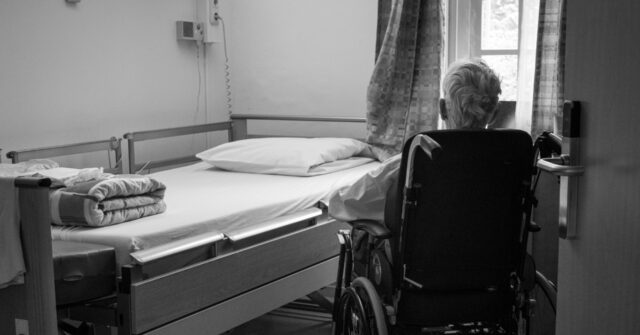Share this @internewscast.com
Medical Assistance in Dying (MAID), Canada’s preferred euphemism for euthanasia, has become so popular practitioners struggle to meet demand.
Based on government data for 2023, MAID constituted 4.7 percent of all deaths across the country, placing Canada second to the Netherlands. The rate in Quebec surpasses seven percent, marking the highest euthanasia rate globally.
Since its legalization in 2016, MAID deaths have risen by double digits annually, especially after the 2021 approval for non-terminally ill patients.
The expansion of legalized euthanasia slowed to 16 percent in 2023, a significant drop from the previous years’ average growth of 31 percent. However, the Canadian government remains unsure about the reasons behind this sharp decline.
Critics argue that Canadian doctors are not only offering assisted suicide but actively advocating it, even for those whose sole medical or psychological issue was contemplating suicide.
In Canada, doctors directly administer euthanasia, rather than providing means for patients to self-administer. The Atlantic published an article on Monday titled “Canada Is Killing Itself,” depicting a doctors’ euthanasia conference in Vancouver, complete with lunch buffets, a DJ, and free tote bags for attendees.
MAID professionals at the convention expressed concern over struggling to meet the current demand for termination services. This demand is anticipated to surge in two years when a postponed provision for euthanasia in cases of mental illness takes effect. The following challenge will be euthanasia for children, a topic already under discussion in the Canadian Parliament.
“Medical professionals who decided early on to reorient their career toward assisted death no longer feel compelled to tiptoe around the full, energetic extent of their devotion to MAID. Some clinicians in Canada have euthanized hundreds of patients,” the Atlantic noted.
Critics of doctor-assisted suicide predicted it would coarsen the medical profession and those predictions have been borne out in Canada. One of the practitioners interviewed by the Atlantic was a maternity doctor turned euthanasia provider who decided to think of both procedures as “deliveries,” no different except that one delivers a new baby into the world, and the other delivers a patient into the hereafter.
“It’s a happy sad, right?” another said of his work. “It’s really sad that you were in so much pain. It is sad that your family is racked with grief. But we’re so happy you got what you wanted.”
No one in Canada really argues about the “slippery slope” anymore – the only argument is over what to call it. MAID proponents see a relentless logic in providing the option of death to ever-larger groups of people.
Once the door was cracked open, the debate shifted to equity instead of morality – why should this group of people have access to MAID, but not that group? Why not everyone? And if everyone can have it, why should doctors not aggressively promote the option, especially when the Canadian healthcare system is overloaded to the point of collapse? MAID recipients do not require follow-up appointments.
Canadians grew skittish when the conversation shifted to offering death as an option to people who might not be capable of making such momentous decisions with clarity, including the mentally ill and children, but that bout of squeamishness seems to be passing.
Health worker killers now speak of having multiple “procedures” per week, and soon it will be multiples per day. Participants in the euthanasia conference attended seminars for using various termination methods, with an eye toward making the patient as comfortable as possible. Meanwhile, online startups have begun offering Canadians assistance with designing their “MAID experience” – from their final earthly hours through post-death ceremonies and helping children adjust to the loss of their parents. Suggestions for helping children adjust include holding “a pajama party at a funeral home” and “painting a coffin in a schoolyard.” Any resemblance between these services and the catered termination experience in the 1973 movie Soylent Green is purely coincidental.
Another booming industry in Canada is the “MAID House,” essentially a form of hospice care that gives patients a warm and comfortable space to be killed in, preferable to the clinical austerity of a hospital or potentially squalid and chaotic conditions at home. MAID Houses make the process of being killed brisk and calm, like saying farewell at an airport departure lounge. Patients spend their final minutes in a La-Z-Boy recliner.
As with many other disruptive social changes, MAID began as a careful and ethically challenging balance between different factors – but now one factor is smashing through all of the others like a bulldozer, that being the concept of “patient autonomy.”
To put it bluntly, no other standard or restriction can survive patients repeatedly demanding euthanasia, even when their illnesses are treatable. When something is normalized, restrictions soon become abnormal. As one Canadian doctor explained to The Atlantic, the early MAID law required prospects to be suffering from an untreatable disease – but if the patient adamantly refuses treatment, anything can become untreatable.
At this point, the biggest roadblock to MAID expansion could be availability, as many Canadian doctors remain uncomfortable with killing. Given how much social and political momentum MAID has, it is surprising how many doctors began having second thoughts after their demand for euthanasia from a patient who was not terminally ill.
The Canadian public still seems to support MAID, but with growing unease that lofty talk of “patient autonomy” is a smokescreen for people being pushed into euthanasia as a cost-effective alternative to prolonged medical treatment. Even the United Nations, specifically its Committee on the Rights of Persons with Disabilities, has grown uneasy with the prospect of “negative, ableist perceptions of the quality and value of disabled lives” tainting the decision-making process for MAID.
If Canada pushes ahead with authorizing MAID for children and the mentally ill, either a large number of doctors will have to master their unease, or more MAID specialists will have to be trained to meet surging demand.
















